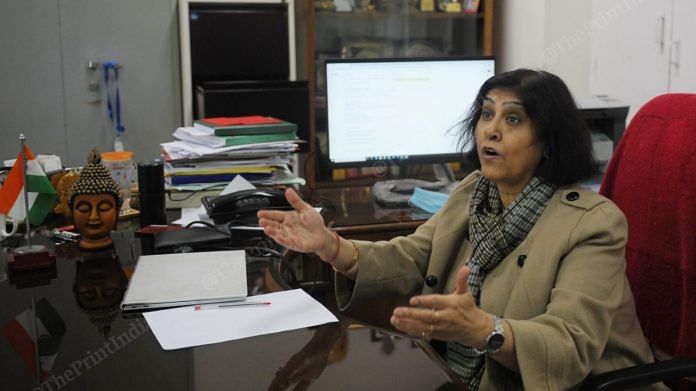New Delhi: People aged above 50 years or those with comorbidities below 50 years of age should approach chief district medical officers and the nearest government primary health clinics to get themselves registered for Covid-19 vaccine, said Dr Suneela Garg, a member of Delhi’s Covid-19 taskforce for vaccination.
In an exclusive interview with ThePrint, Dr Garg, who is also the sub-dean of Maulana Azad Medical College, said people who do not find their name in the list that will be released by the government can raise the matter with health authorities.
Garg, also an advisor to ICMR, said the latest electoral list will be used by the government to identify those who meet the criteria for vaccination, besides healthcare workers and frontline Covid warriors.
“The details of the beneficiaries will be entered in the CoWIN application, which will be accessible by the public once it is live,” added Dr Garg.
She also urged that the media and municipal bodies should play a role in disseminating this information.
Delhi has been preparing for the roll out of a Covid vaccine for the last four months.
“We witnessed a major surge in November and we realised vaccines are the only answer,” said Dr Garg.
Responding to concerns among people about the efficacy of the vaccines approved by India, Dr Garg said, “While there are concerns, it is important to understand that even if one can contract the infection despite getting a vaccine, it won’t be as severe as perhaps it otherwise would have been.”
Citing an example of her own son, who received a vaccine shot for measles earlier, she said, “My husband is a paediatrician and to think the son of a paediatrician got the vaccination shot and then again got infected, but it was a minor one, so it’s important that we don’t be so sceptical and hesitant about getting the vaccine.”
Also read: Everything you need to know about Covaxin, India’s controversial Covid vaccine candidate
‘Don’t come with an empty stomach for vaccination’
Referring to the vaccine dry run that was carried out across three sites in the national capital on 2 January, Garg said “beneficiaries must visit the site (vaccine booth) in a staggered manner” and should be “well-informed about the process”.
She emphasised on the “need to make it a happy experience for the beneficiary and streamline it”. The last beneficiary should be called at 3 pm and “we can’t afford to rush things”, she added. The timing for vaccination will be from 9 am to 5 pm across booths in Delhi.
“There should not be any crowding… beneficiaries should receive text messages specifying their time slots for getting the vaccination shot,” she added.
Garg also said one must come to the site after eating a proper meal and not with an empty stomach. “One faints not just due to nervousness but due to all these factors as well. One must have a proper meal ideally before getting the vaccination shot,” she told ThePrint.
Also read: How Modi govt plans to ensure uptake of Covid vaccine as India inches closer to rollout
100 shots at each booth
Elaborating on how Delhi plans to vaccinate, Garg said that trained officials have been given a target of vaccinating 100 people at each of the 1,000 vaccination booths in the first phase of the vaccination drive.
“The timing will be 9 am to 5 pm across the vaccination booths here and we have 609 cold chain points that have been identified in Delhi of which 603 will be operational in the first phase itself,” she said.
Each of Delhi’s 11 districts will have about 60 cold chain points and 95-100 vaccination booths.
She also confirmed that besides government hospitals and primary health clinics and mohalla clinics, a few private hospitals such as Apollo have also been included in the list of booths.
“The storage facility is extremely important as the vaccine should be kept in a box with temperature between 2 degree Celsius to 8 degrees Celsius so that it doesn’t lose its potency before arriving at the respective booth,” Dr Garg said, adding that Rajiv Gandhi Super Specialty Hospital was the chosen facility in Delhi, and the largest in the national capital, for vaccine storage.
“Four Covid regional stores in Karnal, Mumbai, Chennai and Kolkata will be used for distribution of vaccines, among states and UTs.”
“Delhi is important since it will serve as a transit point for many states and since the (storage) facility (Rajiv Gandhi Super Specialty Hospital) is closer to the airport here, it will save time in delivery,” she further told ThePrint.
From the storage facility, the vaccines will be transported in special vans to all districts. Trained officials will then transport the vaccine from cold chain points to the vaccination booths in Delhi.
‘Idea is to ensure we don’t let anyone die’
Responding to a question about how the government will be segregating individuals with comorbidities, Garg said people suffering from diseases like diabetes, cardiovascular issues, cancer and kidney failure will be the priority.
“The idea is to ensure we don’t let anyone die. However, if there is a case where a person with 20 years of diabetes is there and one who was diagnosed five years ago, we will have to prioritise the former, but eventually everyone will get the vaccine,” she added.
Talking about the duration of protection from the virus after getting the first shot, Dr Garg said, “When we give the first dose for the vaccine, we are mimicking a real time infection in a much milder form and antibodies start developing. In two weeks, these numbers of antibodies increase.”
She said it is advised that one comes for the second shot in 28 days.
Also read: Enough stockpile of Covid vaccine for priority groups in first phase, says Niti Aayog member



